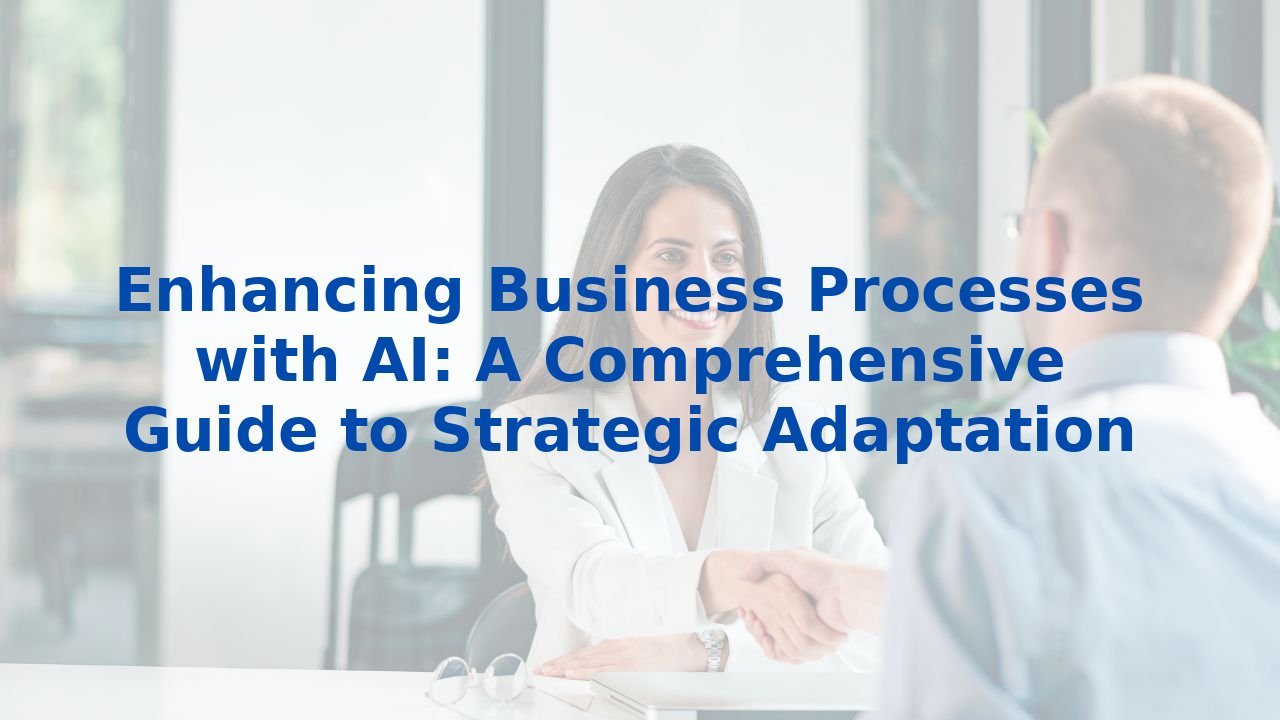Enhancing Business Processes with AI: A Comprehensive Guide to Strategic Adaptation
Enhancing Business Processes with AI: A Comprehensive Guide to Strategic Adaptation
In the intricate dance of the modern business landscape, staying ahead of the curve isn’t just a luxury—it’s a necessity. As we navigate through endless streams of data and ever-evolving market trends, one guiding principle stands tall: the art of strategy. In this context, Artificial Intelligence (AI) emerges not just as a tool, but as a game-changer, revolutionizing business processes and paving the way for efficiency and growth.
1. Automating Routine Tasks
Think about the time spent on mundane tasks—data entry, scheduling meetings, or answering repetitive emails. AI acts as a liberating force here, automating these routine activities. By minimizing human error and allowing team members to redirect their focus on more strategic initiatives, organizations can unlock a realm of productivity. Envision a world where AI assistants handle your calendar, leaving you with precious time for innovation. The potential for transformation is immense.
2. Leveraging Predictive Analytics
Understanding the past is crucial for shaping the future. With AI, organizations can dive deep into historical data, forecast sales, predict customer behavior, and manage inventory with unparalleled accuracy. This predictive capability not only informs strategic decision-making but also enhances operational efficiency, ensuring that businesses remain agile in responding to market demands.
3. Transforming Risk Management
Incorporating AI into risk management can significantly enhance a company’s ability to foresee potential vulnerabilities. By predicting financial downturns or spotting fraudulent activities, organizations are empowered to take preemptive actions. This level of foresight not only protects assets but also cultivates a robust framework for sustained growth in an unpredictable business environment.
4. Enhancing Product Development
Consumer feedback and market trends serve as vital ingredients for successful product development. AI analyzes this vast array of information to inform design and functionality, reducing the time from concept to completion. Imagine the power of quickly prototyping an idea, identifying market fit, or unearthing upselling opportunities through data insights. AI brings speed and precision to product development, helping businesses stay one step ahead.
5. Simulating and Optimizing Processes
AI-driven process simulation is another pivotal enhancement. By examining historical data and identifying patterns, AI allows companies to simulate various outcomes and measure key performance indicators (KPIs). This proactive approach not only uncovers inefficiencies but also estimates the impacts of changes before they are implemented. It’s about making informed decisions rather than relying on guesswork.
6. Real-Time Monitoring and Process Mining
In the era of immediate insights, real-time monitoring is indispensable. AI facilitates process mining by analyzing event logs and detecting anomalies as they occur. This capability empowers organizations to take corrective actions swiftly, ensuring operational consistency and efficiency. A business that can respond in real-time to process deviations holds a distinct competitive edge.
7. Automating Decision-Making
AI's role in decision-making is transforming traditional business paradigms. From human resources to customer service, automation can enhance objectivity and response times. For instance, AI can streamline HR processes by providing data-backed insights on employee engagement or help sales teams prioritize leads effectively. The ripples of AI integration create waves of improvement across every facet of an organization.
8. Harnessing the Benefits of AI
The integration of AI into business processes results in a multitude of benefits. Enhanced efficiency, informed decision-making, and significant cost reductions are just the start. Moreover, with consistent compliance and elevated customer satisfaction, organizations that embrace AI can position themselves as leaders in innovation.
9. The Importance of Training Employees for AI
A powerful tool requires adept hands. As AI reshapes the professional landscape, training becomes imperative. Providing employees with a thorough understanding of AI capabilities and relevant skills ensures that they can wield digital tools effectively. Embracing a culture of continuous learning keeps teams abreast of emerging technologies, fostering an environment ripe for innovation and adaptability.
In conclusion, AI represents a frontier full of possibilities for enhancing business processes. From automating routine tasks and leveraging predictive analytics to transforming risk management and product development, the benefits are compelling. As organizations integrate AI strategically, it becomes crucial to invest in employee training to maximize these advantages. In an ever-evolving world, adapting with AI isn’t just a strategy—it’s a pathway to transformative success, equipping businesses to thrive in the face of change.
For those ready to embrace this journey, exploring opportunities for comprehensive AI training can offer the foundations needed for success. After all, the future belongs to those who prepare for it today.



